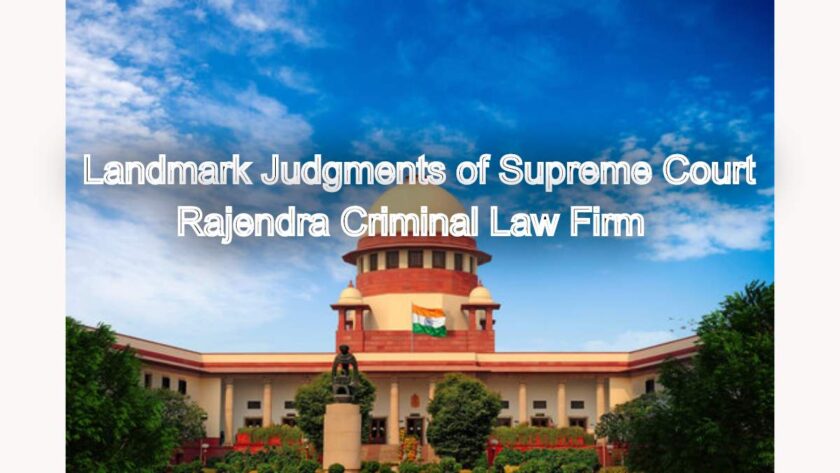Landmark Judgments of Supreme Court: The Supreme Court of India constantly shapes the landscape of criminal jurisprudence. Its judgments reverberate throughout the legal system. They clarify existing statutes. They also introduce new principles. This article highlights several landmark decisions from 2024 and 2025. These rulings significantly impact criminal law practice. They demonstrate the Court’s commitment to justice. Rajendra Criminal Law Firm closely monitors these developments. We ensure our legal strategies reflect the latest pronouncements.
Landmark Judgments of Supreme Court in Criminal Law (2024–2025): Rajendra Criminal Law Firm
I. Safeguarding Procedural Rights and Fair Trial Principles
A cornerstone of criminal justice is the guarantee of a fair trial. The Supreme Court consistently upholds these fundamental rights. In Prabir Purkayastha v. State (NCT of Delhi) (2024 INSC 414), the Court addressed crucial aspects of arrest under the Unlawful Activities (Prevention) Act, 1967 (UAPA). It emphasized the absolute necessity of informing the accused, in writing, of the grounds for their arrest. This judgment reinforces Article 22(1) of the Constitution. It mandates transparency in deprivation of liberty. Consequently, any arrest without written grounds becomes illegal. This ruling strengthens the accused’s right to know why they are being apprehended. Therefore, it provides a vital procedural safeguard against arbitrary detention.
Furthermore, the Court in Sharif Ahmad v. The State of Uttar Pradesh (2024 INSC 363) clarified when a chargesheet is considered “complete” under the Code of Criminal Procedure, 1973 (CrPC). This decision has direct implications for an accused’s right to statutory bail. If a chargesheet lacks essential details, the accused might qualify for default bail. This judgment underscores the prosecution’s duty. They must diligently complete investigations. They must also present a comprehensive report to the court. Thus, this ruling impacts the timeline for detention and investigation.
II. Evolving Standards of Evidence and Proof
The admissibility and appreciation of evidence form the bedrock of criminal trials. The Supreme Court continues to refine these standards. In Perumal Raja @ Perumal v. State (2024] 1 S.C.R. 87), the Court examined the admissibility of evidence gleaned from an accused. This evidence was obtained while the accused was not in formal police custody. The Court clarified that “custody” under Section 27 of the Evidence Act does not strictly require formal arrest. It encompasses any form of police control or surveillance. Consequently, disclosures leading to recovery of facts become admissible. This applies even if formal arrest has not yet occurred. This judgment broadens the scope of admissible evidence. It aids investigative agencies in certain circumstances.
Conversely, in Renuka Prasad v. State (2025 SCC OnLine SC 1074), the Court overturned an acquittal. The High Court had relied solely on the testimony of Investigating Officers. These officers merely repeated statements recorded under Section 161 CrPC. The Supreme Court strongly criticized this approach. It emphasized that conviction cannot rest on mere surmises and conjectures. Eyewitness testimonies and substantive evidence are paramount. This judgment reiterates fundamental principles of criminal jurisprudence. It reinforces the need for independent corroboration. Therefore, it protects accused persons from convictions based on weak evidence.
III. Interpreting Specific Offences and Penal Provisions
The Supreme Court’s pronouncements also provide clarity on specific criminal offences. In Just Rights for Children Alliance v S Harish (2024 INSC 716), a significant ruling emerged. The Court held that possessing child pornography is punishable under the Protection of Children from Sexual Offences (POCSO) Act. This decision unequivocally criminalizes viewing, storing, and possessing child sexual abuse material. It strengthens India’s legal framework against child exploitation. This landmark judgment reflects a robust commitment to child protection. It sends a clear message against such heinous acts.
Furthermore, the Court addressed nuances in cases of abetment to suicide. In Shenbagavalli v. State (2025 SCC OnLine SC 987), the Court clarified what constitutes “abetment.” It emphasized that allegations of past harassment, without proximate mens rea, are insufficient. A higher standard of instigation is required. This ruling aims to prevent misuse of Section 306 IPC. It protects individuals from vexatious prosecutions. Therefore, it sets a crucial precedent for proving the necessary criminal intent.
IV. Bail Jurisprudence and Liberty of the Individual
Bail jurisprudence constantly evolves. The Supreme Court plays a vital role in balancing individual liberty with societal interest. In Arvind Kejriwal v. Directorate of Enforcement (2024 INSC 400), the Court deliberated on interim bail. This specific case involved a high-profile individual. The judgment underscored the Court’s discretion. It can grant interim relief in appropriate circumstances. This decision provides guidance on the factors considered for such temporary release.
In a crucial development, the Court in Frank Vitus v. Narcotics Control Bureau (2024 INSC 479) considered bail conditions. It examined whether an accused could be required to share their location via Google Maps. This ruling explored the limits of bail conditions. It balanced investigative needs with personal privacy. Such pronouncements refine the boundaries of judicial discretion in granting bail. They also shape the future of surveillance as a bail condition.
Most recently, on July 18, 2025, in an important ruling, the Supreme Court suggested to all High Courts to incorporate a mandatory rule. This rule would require accused persons to mention previous bail applications. They must also disclose their criminal antecedents. This step aims to ensure transparency. It also helps courts make informed decisions regarding bail.
V. Broader Implications for Criminal Justice System
Beyond specific offenses, the Supreme Court’s judgments impact the broader criminal justice system. In Bilkis Yakub Rasool v. Union of India (2024] 1 S.C.R. 743), the Court delivered a powerful message on remission policy. It overturned the Gujarat government’s order. This order had allowed premature release of convicts in a heinous crime. The Court emphasized that proper jurisdiction for remission lies with the state where the trial concluded. This ruling upholds the rule of law. It prevents misuse of executive power. Therefore, it reinforces public trust in the justice system.
Furthermore, the Court continues to address the conduct of judicial officers. In State of Uttar Pradesh v. Association of Retired Judges of Supreme Court and High Court at Allahabad (2024 SCC OnLine SC 14), the Court issued guidelines. It instructed judges to exercise caution when summoning government officials. It advised against oral comments that could embarrass officials. This promotes decorum in judicial proceedings. It also streamlines the judicial process. This guidance ensures respectful interaction between branches of government.
Frequently Asked Questions
A1: In Prabir Purkayastha v. State (NCT of Delhi), the Supreme Court ruled that an accused must be informed in writing of the specific grounds for their arrest under UAPA. This judgment emphasizes the constitutional right to know the reasons for detention and ensures procedural fairness.
A2: In Perumal Raja @ Perumal v. State, the Court broadened the definition of “custody” under Section 27 of the Evidence Act. It clarified that formal arrest is not strictly necessary; any police control or surveillance leading to discovery of facts can make disclosures admissible as evidence.
A3: In Just Rights for Children Alliance v S Harish, the Supreme Court unequivocally held that possessing child pornography is a punishable offense under the POCSO Act. This landmark decision strengthens legal measures against child sexual exploitation.
A4: Most recently, on July 18, 2025, the Supreme Court suggested High Courts incorporate a mandatory rule. This rule would require accused persons to disclose all previous bail applications and their criminal antecedents when seeking bail. This promotes transparency and informed judicial decisions.
A5: In Bilkis Yakub Rasool v. Union of India, the Court overturned the Gujarat government’s remission order. It firmly stated that the appropriate jurisdiction for granting remission lies with the state where the trial concluded, not necessarily where the offense occurred. This prevents misuse of executive power in remission matters.
Conclusion
The period of 2024-2025 has witnessed significant pronouncements from the Supreme Court in criminal law. These landmark judgments have refined procedural safeguards. They have clarified evidentiary standards. They have also provided definitive interpretations of various criminal statutes. These rulings strengthen the rule of law. They protect fundamental rights. They also enhance the efficiency of the criminal justice system. At Rajendra Criminal Law Firm, we deeply understand these legal developments. Our commitment lies in providing robust legal defense. We leverage these precedents to secure justice for our clients. Our expertise in criminal jurisprudence ensures comprehensive and effective representation. We remain dedicated to upholding the highest standards of legal advocacy.
Read More
- Can You Approach the Supreme Court Directly for Fundamental Rights Violation?
- Supreme Court Guidelines on Arrests and Bail: What Every Accused Must Know
- How to File a Special Leave Petition (SLP) in the Supreme Court – Step by Step Guide
- How to Lodge Complaints About State Public Works Department (PWD) Officers
- Mastering Commercial Contracts: Legal Insights for Modern Businesses
- Supreme Court of India Official Website:





